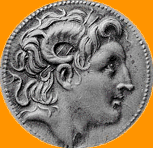|
by Diana K. Sugg At first glance, the case seemed routine: fever, chills and abdominal pain. The illness was fatal and many conditions could be to blame. But the patient was extraordinary: a 32-year-old man with prior battle wounds, a male lover who'd died months earlier and a body that didn't decay for several days. One more thing. At the time of his premature death, this man had conquered the known world. The mystery of Alexander the Great's death is a question that has vexed scholars for centuries. Now, in a novel approach, physicians at the University of Maryland Medical Center have teamed up with a historian and developed a new explanation for what felled this mighty warrior: typhoid fever. In an article published yesterday -- the anniversary of Alexander's death -- in the New England Journal of Medicine, physicians report that his collection of symptoms fit typhoid, a bacterial illness that causes high fever, delirium and an enlarged spleen. "It's a medical whodunit," said Dr. David W. Oldach, an infectious disease expert at Maryland and the primary analyst in the case. The work stems from an annual conference in which the Maryland doctors try to crack medical mysteries of historical figures. Dr. R. Michael Benitez, a Maryland cardiologist who co-authored the article, said the next cases involve the death of Ludwig van Beethoven and determining the sanity of Col. George Custer, the U.S. Army officer killed in a lopsided battle.
"There is no certainty about this, but we probably are making a better guess than anyone has before," Borza said, adding that there might have been multiple causes. Other possibilities the team discarded included poisoning and alcoholism. "I think it's a reasonable hypothesis," Dr. Frank L. Holt, a historian at the University of Houston, said of the typhoid diagnosis. But he noted that it's hard to eliminate other possibilities, with so much information missing. "There will always be some doubt in any retro-diagnosis." The closest narrative account that survives of Alexander's reign wasn't written until 300 years after his death in 323 B.C. And much of the information paints a contradictory picture of him, either as learned and noble leader, or a cruel conqueror who set the stage for dictators like Hitler. He was the son of Philip II, the king of
Macedonia, a region that today includes parts of Greece,
Bulgaria and the new Republic of Macedonia. Tutored by
Aristotle, Alexander reportedly once sent soldiers back from
the war front to get him more books to read. He's also
widely considered to be one of the most brilliant war
generals of all time. Charging across tens of thousands of miles to the border of India, this short, stocky charismatic man was always the first to go over the wall. He survived brutal battle wounds that caused temporary vision loss and punctured a lung. But one June evening at a feast in Babylon, he was drinking a huge bowl of wine when he suddenly cried out in pain and grabbed at his chest. Over the next 11 days, he developed a high fever, chills and abdominal pain. He eventually became so weak that he could only move a finger or flutter his eyelashes. Today, antibiotics cure typhoid fever, but in ancient times, Alexander got the best they had: baths in cool water and chest compresses. For centuries, experts believed that Alexander had been poisoned. It was a good theory. His father, mother, half-brother, sister, wife and son were all assassinated. By the 1900s, a new theory was advanced, that Alexander suffered from malaria, a common, serious infectious illness marked by chills, fever and headache. He bathed in the Euphrates River, infested by mosquitoes that carry malaria. But Oldach said abdominal pain is much more common in patients with typhoid fever. People contract this bacterial illness from contaminated food or water. Untreated, many victims suffer abdominal pain and tenderness because of a perforated bowel or other complications. This brings on a continuous fever and other symptoms like Alexander's, Oldach said. It may even offer a medical explanation for his body not decaying. Typhoid patients can develop an acute, ascending paralysis from their feet through the rest of their bodies and the Maryland physicians speculate that if Alexander suffered from this, he may have appeared to be dead before he actually was, so his body didn't decay right away.
Increasingly, scientists from various fields are teaming up to answer tough questions from the past, creating an atmosphere of cross-pollination where one asks a question the other hadn't even considered. In medicine, these clinical pathology conferences are a classic teaching tool, a ritual that enables medical students, residents and physicians to observe a physician's deductive powers and clinical reasoning. There are rules to the game: Doctors must be able to come up with a diagnosis that unifies the case. They also have to recognize red herrings, such as the report of Alexander's body not decaying, Oldach said. After a presentation, a debate ensues. And the Maryland team expects their article to spark one in the pages of the journal in the coming weeks. "Is this diagnosis the bottom line? No, the point was to engage people in a thoughtful process of considering what happened to this man," Oldach said. "Other people will have different conclusions -- and we're going to hear about them." Pub Date: 6/11/98 Dr. David W. Oldach is a University of Maryland infectious disease expert who led the study into the death of Alexander the Great. |
 A
riddle greater than Alexander
A
riddle greater than Alexander
 By
teaming up with historians, these physicians are getting
information the symptoms don't tell them. Dr. Eugene N.
Borza, a professor emeritus of ancient history at
Pennsylvania State University, was quizzed by Maryland
doctors about Alexander's battle wounds, his grief over the
death of his lover, Hephaestion, and the 12 pints of wine he
drank the night he became ill. Borza said he had previously
thought -- like many others -- that malaria killed
Alexander.
By
teaming up with historians, these physicians are getting
information the symptoms don't tell them. Dr. Eugene N.
Borza, a professor emeritus of ancient history at
Pennsylvania State University, was quizzed by Maryland
doctors about Alexander's battle wounds, his grief over the
death of his lover, Hephaestion, and the 12 pints of wine he
drank the night he became ill. Borza said he had previously
thought -- like many others -- that malaria killed
Alexander.
 But
Oldach said he and the others believe the body not decaying
is a legend created by those who survived him, a red herring
in the case that should be discarded. They also believe that
Alexander's immune system may have been weakened by his
prolonged, intense grief for his lover, a childhood friend
and valued military general who died in the summer of 324
B.C.
But
Oldach said he and the others believe the body not decaying
is a legend created by those who survived him, a red herring
in the case that should be discarded. They also believe that
Alexander's immune system may have been weakened by his
prolonged, intense grief for his lover, a childhood friend
and valued military general who died in the summer of 324
B.C.